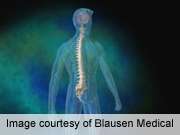For patients with traumatic burst fractures of the thoracolumbar spine who are treated with pedicle screw fixation and direct end-plate restoration, adjacent intervertebral discs do not routinely progress to severe degeneration at 12 to 18 months post-injury, according to a study published in the March issue of The Spine Journal.
(HealthDay)—For patients with traumatic burst fractures of the thoracolumbar spine who are treated with pedicle screw fixation and direct end-plate restoration, adjacent intervertebral discs do not routinely progress to severe degeneration at 12 to 18 months post-injury, according to a study published in the March issue of The Spine Journal.
Jorrit-Jan Verlaan, M.D., Ph.D., from the University Medical Center Utrecht in the Netherlands, and colleagues conducted a prospective trial involving 19 adult patients to examine whether intervertebral discs adjacent to traumatic burst fractures degenerate irrevocably or survive. Participants had traumatic burst fractures of the thoracolumbar spine and were treated with pedicle screw fixation and direct end-plate restoration. Pre-operative magnetic resonance imaging scans were obtained and were compared with those obtained one month after surgery, and one month after screw removal, 12 to 18 months after surgery.
The researchers found that, pre-operatively, all 38 discs showed mild to moderate degeneration of the intervertebral disc. At 12 to 18 months post-trauma, five discs showed evidence of progression to severe or end-stage degeneration, while the others did not exhibit evidence of progression of degeneration.
"In summary, intervertebral discs adjacent to traumatic burst fractures do not routinely seem to progress to severe degeneration at 12 to 18 months after injury when treated with pedicle screw instrumentation and direct end-plate restoration," the authors write.
Several authors disclosed financial ties to the medical device industry.
More information:
Abstract
Full Text (subscription or payment may be required)
Editorial (subscription or payment may be required)
Journal information: Spine Journal
Health News Copyright © 2013 HealthDay. All rights reserved.






















